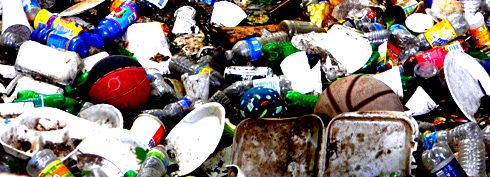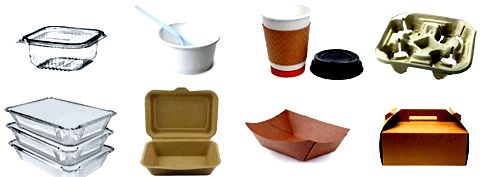The Meals Service Packaging Needs started on The month of january 1, 2017. The District&rsquos Foam Ban required impact on The month of january 1, 2016.
If you notice a company using non-compliant products, leave some advice or call (202) 671-0080.
Background
Effective The month of january 1, 2017, new rules mandate District companies and organizations that sell or serve food or beverages within the District to solely use recyclable or compostable food service products.
Packaging waste occupies a lot of only a little space obtainable in our landfills. Recyclable and compostable alternatives, however, could be reconstituted into other helpful products. The District is applying rules around the materials that you can use for everyone food to lessen our waste.

Needs from the Law
What the law states pertains to any food service products created for single use. Included in this are take-out containers, bowls, plates, trays, cups, utensils, along with other products.
What the law states doesn’t affect:
- Food or beverages filled and sealed in foam containers before a business receives them (e.g., foam cartons of eggs packaged outdoors from the District)
- Materials accustomed to package raw, uncooked, or butchered meat, fish, chicken, or sea food
- Foam food service products purchased for use at home
Rules for that 2017 compostable and recyclable needs derive from the Mayor&rsquos Listing of Recyclables and Compostables, that was printed on December 21, 2016.
Final rules for that 2017 food service packaging needs were printed within the Electricity Register on Feb 3, 2017.
Controlled Entities
Business or organizations that sell or provide food are susceptible to the needs from the law. These rules affect all food service ware products accustomed to serve consumers. Types of controlled entities include, but aren’t restricted to:
- Bars,
- Delis,
- Cafes,
- Cafeterias,
- Carry-outs,
- Food trucks,
- Restaurants,
- Supermarkets,
- Daycare providers,
- Firms that provide free coffee to clients,
- Places of worship that provide coffee to parishioners following a service, and
- Non-profit organizations that host a breakfast and supply food for attendees.
Compliant Products
DOEE defines recyclable and compostable based on the Mayor&rsquos Listing of Recyclables and Compostables. DOEE will issue warnings for that first 3 months following the effective date to ensure that controlled entities have plenty of time for that transition to compliant products.
Goods are considered* recyclable if they’re made from:
- Rigid plastics
- #1: polyethylene terephthalate (PET),
- #2: high-density polyethylene (HDPE)
- #4: low-density polyethylene (LDPE)
- #5: polypropylene (PP)
- #6: polystyrene (PS)
Goods are considered* compostable if they’re:
- Made entirely of uncoated paper or plant fiber
- Made from paper or pulp having a wax coating
Certified compostable through the Biodegradable Products Institute (listing of certified products are available at products.bpiworld.org.

| Types of Non-Compliant Products | Types of Compliant Products |
|
– Sandwich twist ties – Aluminum-coated paper to-go containers – Products which are a plastic and paper mix (paper bags having a plastic window, paper cups having a foam exterior, etc.) – Plastic film made from unrecyclable plastic resins (Saran wrap, other wraps made from plastic #7) |
– Rigid plastic or paper clamshells, plates, bowls, trays along with other to-go containers
– Coffee and soda cups – Coffee and soda cup covers – Pizza boxes – Coated paper soup containers – Sandwich wraps, deli-liners, and pastry bags (wax-coated or BPI-certified) – Rigid plastic or wooden utensils – Condiment cups – Napkins – Uncoated Kraft paper – Plastic or wooden coffee stirrers – Straws – Kraft paper bags – Loaves of bread boxes – Molded pulp drink carriers -Aluminum foil – Plastic film made from recyclable resins (#1, #2, #4, #5, #6) |
*Reference the Mayor&rsquos Listing of Recyclables and Compostables for an entire listing of recyclable and compostable materials.
Companies will likely have the ability to purchase compliant products wherever they presently purchase food service ware. Ask your supplier about recyclable or compostable products, or view DOEE&rsquos listing of vendors that sell compliant products.
Take a look at these videos of some local companies discussing types of their effective conversion to recyclable or compostable foam-free alternative products:
 La Mano, Culture Coffee,
La Mano, Culture Coffee,
Queen Vic, Founding Maqui berry farmers
Enforcement
DOEE will first assist controlled entities with achieving compliance through outreach and education. DOEE may also solicit tips in the public and conduct regular inspections, issuing warning letters to entities that aren’t in compliance. Following the duration of compliance assistance is finished, DOEE may issue fines to food providers that still distribute foam products.
Questions?
To learn more, please contact (202) 671-0080 or (202) 535-2239.
- Converted Food Service Packaging Compliant Products info sheets
Resourse: https://doee.electricity.gov/